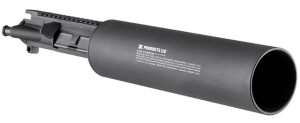EasyTrust: Problems reported
David McCleary a Michigan Gun Trust Lawyer written about the problems he has seen with the so called EasyTrust Gun Trust by Silencerco. Today I received an email from him stating that in his opinion the trust is “horribly drafted” and “has many problems including improper legal advice”. One example cited is the mistake that a Trust in Michigan must be registered. This is simply not true and is misleading to consumers. A Gun Trust or other Michigan NFA Trust does not need to be registered in Michigan. While they can be, they do not need to be registered and Attorney McCleary recommends not registering them.
More information on the EasyTrust Problems :For those of you who have not heard about other problems with the Easy Trust, you may review them below or follow this link https://www.guntrustlawyer.com/2015/04/atf-statements-at-the-nra-firearms-law-seminar.html
Back in April after the NRA convention, the ATF was commenting about some of the poorly written trusts and the problems and opportunities they would create for lawyers in the future. That article mentions many of the EasyTrust problems. Here is an excerpt from the Article in April which mentions the EasyTrust Problems.
With the recent increase in poorly written online trusts that have become available, ATF feels there will be a big business in fixing them down the road for those who have unknowingly received the free or fill in the blank trusts.
In my opinion, one of the worst examples of an online trust we have seen is the Easytrust being promoted by Silencerco. According to them, there may be as many as 1000 people who have already received this trust which contains numerous problems. For a trust that is only 4.5 pages long, it appears to have even more problems than a Gun Trust drafted from Quicken. The list of problems is huge, but the biggest problems include:
- The trust permits a trustee to easily violation the NFA throughout the document by not clearly prohibiting these violations.
- The trust permits any trustee to sell your guns without your consent.
- The Trust permits trustees to take away your gun rights, (from within the trust) if in their opinion you can’t handle your own affairs. Of course, your legal gun rights under the 2nd Amendment will not be removed, but your ability to use and have access to the guns in your trust can.
- The trust directs distribution to beneficiaries upon your death without any written permission (a violation of the NFA)
- The instructions incorrectly state that the trust needs to be registered in many states where it does not (seems to be similar to the problem we reported with the quicken trust)
- Directs you to obtain an EIN number for their trust when it is not necessary, if requested from your bank. The instructions should state why an EIN number is not required and direct you on a proper response to provide the bank or how to deal with this common misunderstanding to tax law that many banks can initially make
(Updated 4/19/15 for a clarification). (A summary of the EasyTrust problems) Continue reading





